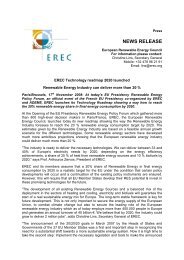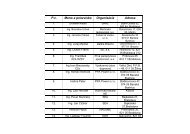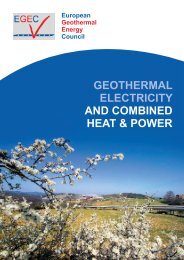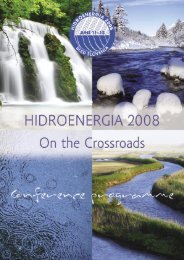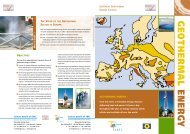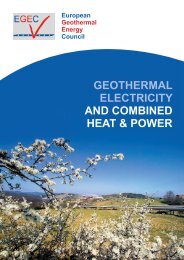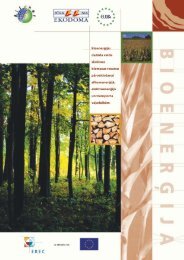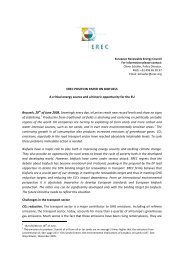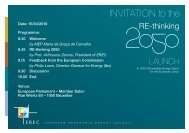CTO Assessment - European Commission
CTO Assessment - European Commission
CTO Assessment - European Commission
Create successful ePaper yourself
Turn your PDF publications into a flip-book with our unique Google optimized e-Paper software.
Renewable Energy Sources in Cities<br />
Nearly 80% of the <strong>European</strong> population<br />
live, work, and use leisure facilities<br />
in cities, and almost the half in<br />
cities with more than 50.000 inhabitants.<br />
Nearly 70% of the energy consumption<br />
occurs in cities. The development<br />
of sustainable energy strategies<br />
in urban areas is clearly a priority.<br />
It is not only the large numbers of<br />
energy consumers which is at stake,<br />
but also the quality of the urban environment<br />
which is of fundamental<br />
concern, and for which the implications<br />
go far beyond the local community.<br />
Apart from environmental considerations,<br />
a local sustainable energy<br />
policy can have major impacts<br />
on employment, social cohesion, participation<br />
of civil society, and economic<br />
development, as well as on urban<br />
governance.<br />
Examples have shown that proactive<br />
RES policies in cities can substantially<br />
increase the share of RES,<br />
thereby improving living conditions<br />
and contributing to reaching the objectives<br />
outlined by the United Nations<br />
in the AGENDA 21 initiative.<br />
In Europe, implementation of Agendas<br />
21 as vector of RES penetration<br />
relies on the excellent support of the<br />
<strong>European</strong> Sustainable Cities & Towns<br />
Campaign, developed after the approval<br />
of the Aalborg charter.<br />
More recently, there have been clear<br />
signs of a political commitment towards<br />
more integrated policies and<br />
concepts aiming to convey sustainable<br />
energy strategies into city policies.<br />
Such commitments aim at demonstrating<br />
the benefits of a high degree of<br />
decentralised energy supply through<br />
recourse to new and renewable energy<br />
sources, in combination with a<br />
conscious application of leading energy<br />
efficiency measures in the various<br />
end-use sectors. Recent <strong>European</strong><br />
legislation in the energy field, such<br />
as the Directive on the Energy Performance<br />
of Buildings, pushes forward<br />
this integrated approach, and<br />
should open the opportunity for more<br />
efficient consumption through ambitious<br />
urban rehabilitation.<br />
Several large urban areas across Europe<br />
have demonstrated an outstanding<br />
level of excellence with regard to<br />
the integration of sustainable energy<br />
concepts, including renewable energies.<br />
Both in the North and the South<br />
of Europe, several examples illustrate<br />
how far awareness of and commitment<br />
to renewable energy solutions can<br />
make cities improve in their<br />
energy planning and resource<br />
management. Politicians,<br />
planners, developers<br />
and citizens are all key<br />
stakeholders in this process,<br />
and can help to<br />
achieve a genuine change<br />
in the urban energy scene.<br />
This session will present examples<br />
of successful achievements in<br />
sustainable strategies, discuss barriers<br />
and challenges, assess the impact<br />
of policy frameworks and come up<br />
with future needs for public intervention<br />
on the level of municipal authorities,<br />
Member States frameworks and<br />
<strong>European</strong> intervention.<br />
RE Communities<br />
13




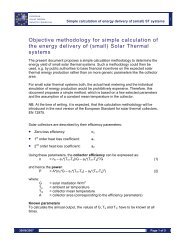

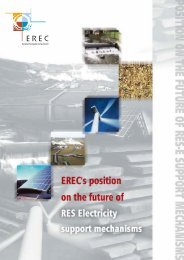
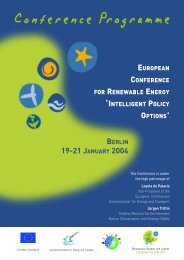
![Energy [R]evolution - Greenpeace](https://img.yumpu.com/47174859/1/184x260/energy-revolution-greenpeace.jpg?quality=85)
